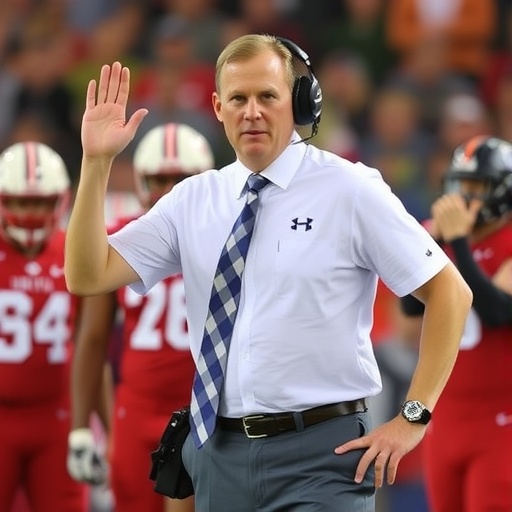BYU Cougars Dominate Big 12: Houston’s Rise Shakes Conference While Baylor’s Dave Aranda Faces Mounting Pressure
In a stunning turn of events in the NCAA college football landscape, the BYU Cougars have seized control of the Big 12 Conference standings with a flawless record that’s turning heads nationwide. As the season hits its midpoint, BYU’s dominant performances have not only propelled them to the top but also spotlighted emerging threats like the Houston Cougars, whose surprising surge is rewriting the conference narrative. Meanwhile, Baylor Bears head coach Dave Aranda is under intense scrutiny as his team’s early-season woes threaten to derail their campaign entirely.
The Big 12, known for its high-octane offenses and fierce rivalries, is experiencing unprecedented volatility this year. BYU, entering the conference as newcomers in 2023, has wasted no time asserting dominance. With a 6-0 record overall and 3-0 in conference play, the Cougars are averaging 42 points per game while holding opponents to just 17. This offensive firepower, led by quarterback Jake Retzlaff, has been the talk of the NCAA, drawing comparisons to past powerhouse eras in Provo.
BYU’s Offensive Onslaught Propels Cougars to Big 12 Summit
The BYU Cougars’ ascent to the pinnacle of the Big 12 hasn’t been by accident—it’s the result of meticulous preparation and explosive playmaking. In their latest thriller, a 38-24 victory over the Kansas State Wildcats, Retzlaff threw for 312 yards and three touchdowns, showcasing the precision that’s become synonymous with BYU’s attack. Head coach Kalani Sitake credited the team’s chemistry: “We’ve built this program on faith and fundamentals, but this year’s group has that extra gear. They’re executing at an elite level.”
Statistically, BYU leads the conference in total yards per game at 482, a mark that ranks them in the top 10 nationally in the NCAA. Wide receiver Chase Roberts has been a revelation, hauling in 28 receptions for 452 yards and five scores, making him a prime candidate for All-Big 12 honors. Defensively, the Cougars’ secondary has intercepted eight passes already, with cornerback Jakob Robinson emerging as a lockdown specialist. This balanced approach has allowed BYU to outscore opponents by an average margin of 25 points in conference games.
Contextually, BYU’s success is amplified by their transition from the independent ranks to the Big 12. Last season’s 5-7 finish was a wake-up call, but offseason recruitments and strategic coaching hires have transformed the program. Athletic director Tom Holmoe noted in a recent press conference, “BYU is back, and we’re here to stay at the top of this conference.” Fans in Provo are buzzing, with attendance at LaVell Edwards Stadium up 20% from last year, signaling a resurgence that’s capturing national attention.
Looking deeper, BYU’s schedule has been no cakewalk. Victories over powerhouses like Baylor and Cincinnati have solidified their credentials. In a pivotal matchup against the Bears in Week 4, BYU rallied from a 14-point deficit to win 35-28, a game that exposed vulnerabilities in other conference teams. Analysts from ESPN’s College GameDay praised the Cougars’ resilience: “BYU isn’t just winning; they’re dictating the pace of the Big 12.” This dominance positions them favorably for the College Football Playoff, where a conference title could secure an automatic bid.
Houston Cougars Emerge as Big 12 Dark Horses with Relentless Defense
While BYU commands the spotlight, the Houston Cougars are quietly climbing the ranks, their stock rising faster than anyone predicted at the season’s outset. With a 5-1 record and 2-1 in Big 12 play, Houston has flipped the script on preseason doubters who pegged them as cellar-dwellers. Quarterback Donovan Smith has been the catalyst, completing 68% of his passes for 1,200 yards and 10 touchdowns, but it’s the defense that’s truly elevating Houston’s profile.
The Cougars’ defensive unit ranks second in the Big 12 for points allowed, surrendering just 18 per game. Linebacker Kamari Ramsey leads the charge with 45 tackles and three sacks, embodying the gritty style instilled by first-year head coach Willie Fritz. In a statement win against TCU last weekend, Houston’s defense forced four turnovers in a 31-20 upset, propelling them into the national conversation. Fritz remarked post-game, “Our guys play with heart. We’re not the biggest or fastest, but we’re the toughest.”
Houston’s rise is rooted in their move to the Big 12 from the American Athletic Conference, where they were perennial contenders but lacked the exposure. This season, they’ve capitalized on a favorable schedule, including non-conference wins over UNLV and Rice. Offensively, running back Stanton Ramil has pounded out 650 rushing yards, providing balance to Smith’s aerial assault. These efforts have Houston averaging 35 points in their last three games, a stark improvement from last year’s 22-point average.
In the broader NCAA context, Houston’s trajectory mirrors underdog stories like those of past Big 12 surprises, such as the 2019 Oklahoma State team. Recruiting gains are also fueling optimism; the Cougars secured a top-40 class this offseason, bolstering their depth. TDECU Stadium attendance has surged by 15%, with local media highlighting the program’s growing fanbase. As Houston eyes tougher tests against Utah and Kansas, their momentum could challenge BYU’s lead, potentially creating a two-horse race for the conference crown.
Experts are taking notice. Big 12 Network analyst Joel Klatt tweeted, “Houston is the team no one saw coming. Their defense could carry them to a bowl game—and maybe more.” This unexpected ascent is injecting fresh drama into the conference, forcing teams like Oklahoma and Texas to recalibrate their strategies.
Baylor Bears Stumble Early: Dave Aranda’s Job Security in Jeopardy
Contrasting the highs of BYU and Houston are the lows plaguing the Baylor Bears, where head coach Dave Aranda finds himself on the hottest seat in the Big 12. With a disheartening 2-4 record and 1-2 in conference, Baylor’s season has unraveled amid defensive lapses and offensive inconsistencies. Aranda, who led the Bears to a Big 12 title in 2021, is now facing pointed criticism from fans, boosters, and media alike.
The struggles began in Week 1 with a 45-31 loss to Utah, exposing Baylor’s secondary woes. Quarterback Sawyer Robertson has thrown seven interceptions against just five touchdowns, while the run game, once a strength, manages only 120 yards per contest. Defensively, the Bears rank last in the Big 12 for sacks (eight total) and rushing defense (allowing 180 yards per game). In their most recent defeat, a 38-24 setback to BYU, Aranda’s play-calling drew ire, particularly a failed fourth-down attempt late in the game.
Aranda addressed the mounting pressure in a somber presser: “We’re not where we want to be, but these are teachable moments. The players believe in the process, and so do I.” However, whispers of dissatisfaction are growing louder. Baylor’s athletic director, Mack Rhoades, has remained publicly supportive but emphasized accountability. Fan forums on Baylor’s official site are flooded with calls for change, with attendance dipping 10% at McLane Stadium.
Contextually, Aranda’s tenure has been a rollercoaster. After a 12-2 campaign in 2021, back-to-back losing seasons in 2022 and now 2023 have eroded goodwill. Injuries to key players like running back Dominic Richardson have compounded issues, but critics argue poor preparation is the root cause. In the NCAA landscape, coaches on hot seats like Aranda face intense scrutiny; comparable situations at programs like Arizona State led to midseason firings in recent years.
Financially, Baylor’s buyout clause for Aranda stands at $10 million, a hefty sum that might deter immediate action. Yet, with high-stakes games against Iowa State and West Virginia looming, the pressure is unrelenting. Former Baylor standout Terrell Bernard, now with the Buffalo Bills, offered encouragement via social media: “Bear Nation, stick with Coach Aranda. Turnarounds happen.” But with the Bears’ playoff hopes fading, the clock is ticking.
Big 12 Playoff Implications: BYU and Houston Reshape Conference Dynamics
As the Big 12 season intensifies, the performances of BYU, Houston, and the faltering Baylor squad are reshaping the conference’s path to the College Football Playoff. BYU’s lead gives them a stranglehold on the automatic qualifier spot, but Houston’s upset potential could force a multi-team scramble. Projections from the NCAA’s official playoff committee currently rank BYU at No. 12 nationally, with Houston cracking the top 25 at No. 23.
Key upcoming matchups will be decisive. BYU faces Oklahoma on November 18, a game that could catapult them into the top 10. Houston’s clash with Utah on October 21 might serve as a litmus test for their contender status. For Baylor, a win streak is essential to salvage Dave Aranda’s job and the program’s momentum. Conference-wide, these shifts highlight the Big 12’s parity, with no clear frontrunner beyond BYU.
Looking ahead, the implications extend to recruiting and NIL deals. BYU’s success could attract top talent from California and Texas, bolstering their roster for 2025. Houston’s rise positions them as a destination for defensive-minded recruits, while Baylor must stabilize to avoid a talent exodus. Analysts predict a thrilling finish, with the Big 12 potentially sending two teams to the playoff—a feat that would underscore the conference’s resurgence.
In the end, this season’s narrative in the Big 12 is one of evolution: BYU’s control, Houston’s ascent, and Baylor’s trials setting the stage for what promises to be an unforgettable championship race. Stakeholders from Provo to Waco are watching closely, knowing that every snap could alter destinies.








